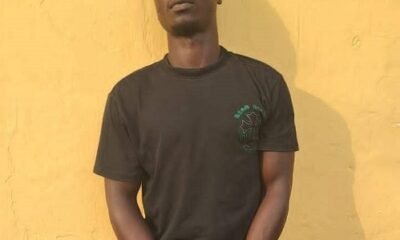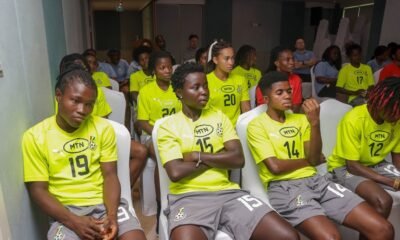News
Alhaji Seidu Abdulai conferred with Royal Appreciation Certificate

The Metropolitan Chief Imam of Kpone-Katamanso, Alhaji Seidu Abdulai, has been conferred with a Royal Appreciation Certificate by His Royal Highness Nii Teye Kojo Amankwah Sune I, Chief of Gbetsile.
The certificate was in recognition of Imam Abdulai’s exceptional commitment and contributions to the development and cohesion of the Gbetsile community.
This was made known in a statement issued and copied to The Ghanaian Times over the weekend.
The statement noted that the citation accompanying the award highlights Imam Abdulai’s remarkable commitment and invaluable support towards the growth and development of the Gbetsile Community.
“In recognition of your remarkable commitment and invaluable support towards the growth and development of the Gbetsile Community. Your selfless dedication continues to make a lasting impact,” it said.
It stated that the Chief Imam’s selfless dedication has made a lasting impact on the community, and he is widely respected for his religious leadership and multifaceted role in community advancement.
“Imam Abdulai’s work transcends the mosque, encompassing socio-cultural development, interfaith engagement, and grassroots governance initiatives,” it noted.
It underscored that he has played a vital role in fostering peaceful coexistence between the Muslim and Christian communities in the area, reflecting the national efforts of the Chief Imam of Ghana, Sheikh Dr Osman Nuhu Sharubutu.
With a master’s degree in Democracy, Governance, Law, and Development from the University of Cape Coast, Imam Abdulai brings both theological insight and academic training to his work.
He is also a trained counsellor, certified by the Ghana Psychology Council and trained at the TUCEE Institute of Technology and Counselling.
This dual expertise enables him to offer holistic guidance spiritually, emotionally, and socially to members of the community.
His Royal Highness Nii Teye Kojo Amankwah Sune I described Imam Abdulai as “a pillar of unity and development,” whose enduring dedication continues to strengthen the social fabric of Gbetsile.
This recognition serves as a testament to Imam Abdulai’s individual efforts and an affirmation of the critical role that religious and traditional leaders play in promoting social harmony, interfaith cooperation, and community progress.
The award is a well-deserved recognition of Imam Abdulai’s outstanding contributions to the Gbetsile community
News
Man sentenced to 25 years for robbery at Manso Akwasiso

A 30-year-old man has been sentenced to 25 years imprisonment with hard labour by the Bekwai Circuit Court for his role in a 2022 robbery at a mining site at Manso Akwasiso in the Ashanti South Region.
The convict, Dominic Ofori, also known as Fanta, was arrested on 16th February 2026 after years on the run. He pleaded guilty before the Bekwai Circuit Court to robbery contrary to Section 149 of the Criminal Offences Act, 1960 Act 29, and was accordingly sentenced to 25 years imprisonment with hard labour.
On March 20, 2022, the Manso Adubia District Police received intelligence that a group of armed men from Manso Abodom were planning to attack a mining site at Manso Akwasiso to rob the owner of gold concentrate. Acting on the information, police mounted a coordinated operation and laid an ambush at the site.
At about 5:30 pm the same day, four-armed men arrived at the site, fired indiscriminately, and robbed the miners of their gold concentrate. The police team on surveillance intervened, resulting in an exchange of gunfire.
Three of the suspects, Abu Abubakar, Musah Latif, and Gideon Takyi, sustained gunshot wounds and were pronounced dead on arrival at St Martins Catholic Hospital at Agroyesum. Dominic Ofori escaped at the time but was later arrested and put before the court.
The Ashanti South Regional Police Command has assured the public of its continued commitment to combating violent crimes and bringing offenders to justice.
News
Ashanti police arrest man for publishing false news on TikTok

The Ashanti Regional Police Command has arrested 45-year-old Isaac Boafo, also known as “Duabo King,” for allegedly publishing false news intended to cause fear and panic.
Police said the arrest follows a viral TikTok video in which Boafo claimed that four officers at the Central Police Station in Kumasi engaged in inappropriate conduct with commercial sex workers during night patrols in Asafo.
Officers from the Police Intelligence Directorate (Ashanti Region) apprehended Boafo after receiving intelligence about the video.
During questioning, he admitted to creating the video to attract views and engagement online, and acknowledged that he could not prove the allegations.
Boafo also admitted making comments about the President of the Republic for content purposes and could not defend those statements.
He has been formally charged and is in detention as investigations continue.
The Ashanti Regional Police have warned the public against publishing or sharing false information on social media, noting that such acts can cause fear, panic, and damage reputations.
They said anyone found engaging in similar conduct will face legal action.
By: Jacob Aggrey














